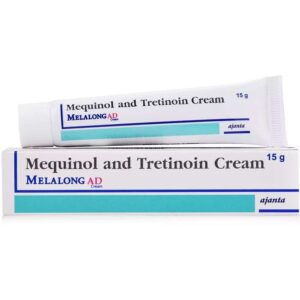HYDROQUINONE + TRETIROIN
Hydroquinone: Hydroquinone is a topical skin-lightening medication commonly used to treat hyperpigmentation such as dark spots, melasma, and age spots. It works by inhibiting the production of melanin, the pigment responsible for giving color to the skin.
When applied to the skin, hydroquinone works by interfering with an enzyme called tyrosinase, which is involved in the production of melanin. By inhibiting tyrosinase, hydroquinone reduces the amount of melanin being produced, leading to a lightening effect on the skin.
Hydroquinone is typically available as a cream, gel, or solution and is usually applied to the affected areas of the skin twice daily. It is important to follow the dosage instructions provided by a healthcare professional or as indicated on the product label.
While hydroquinone can be effective in treating hyperpigmentation, it is important to note that long-term use or misuse can lead to potential side effects. The most common side effects include skin dryness, redness, itching, stinging, and a mild burning sensation. Some individuals may also experience skin irritation or a darkening of the treated area, which is a condition known as exogenous ochronosis. In rare cases, hydroquinone can cause an allergic reaction, characterized by severe itching, rash, or swelling.
Hydroquinone should not be used on broken or irritated skin, and it is generally advised to avoid exposure to sunlight or artificial UV light while using this medication. It is important to consult a healthcare professional before using hydroquinone, especially if you have a history of allergies or sensitive skin.
Overall, hydroquinone can be an effective treatment for hyperpigmentation, but it is important to use it under the guidance of a healthcare professional, follow dosage instructions, and be aware of potential side effects.
Tretiroin: Tretinoin, also known as all-trans retinoic acid or ATRA, is a medication commonly used for the treatment of acne and to reduce the appearance of fine wrinkles and certain skin discoloration. It belongs to a class of medications called retinoids, which are derived from vitamin A.
Tretinoin works by affecting the growth of skin cells. It helps to normalize the turnover of skin cells, preventing the formation of new acne lesions and promoting the shedding of dead skin cells. It also has the ability to stimulate the production of collagen in the skin, leading to improved skin texture and reduction in the appearance of wrinkles.
The dose of tretinoin will vary depending on the condition being treated and your individual response to the medication. It is usually applied topically to the affected areas once daily, preferably in the evening, after washing and drying the skin. It is important to follow the instructions provided by your healthcare provider or the product label. A pea-sized amount is typically sufficient to cover the entire face.
Common side effects of tretinoin include skin dryness, redness, peeling, and a mild burning or stinging sensation. These side effects are usually temporary and may occur during the initial weeks of treatment as the skin adjusts to the medication. It is important to use moisturizers and sunscreen while using tretinoin as it can increase the skin’s sensitivity to the sun.
Less common but more serious side effects may include severe skin irritation, blistering, or swelling. If you experience any of these side effects, it is important to contact your healthcare provider.
Tretinoin should not be used during pregnancy as it can cause harm to the developing fetus. It is also not recommended for use in individuals with a history of hypersensitivity to retinoids.
In summary, tretinoin is a medication commonly used for the treatment of acne and to reduce the appearance of fine wrinkles and skin discoloration. It works by affecting the growth of skin cells and is usually applied topically. Side effects are generally mild and include skin dryness, redness, peeling, and a mild burning sensation. It is important to follow the instructions provided by your healthcare provider and avoid excessive sun exposure while using this medication.

